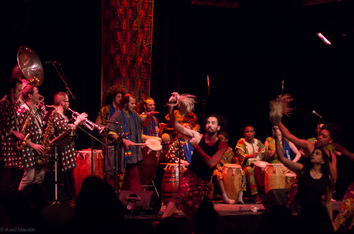
Adanu Habobo was formed in August 2012 by Dr. Kofi Gbolonyo and Curtis Andrews who share a common love and passion for the culture of Ghana, especially that of the Ewe and related peoples of Togo and Benin. Together, they laid the foundation for Adanu and lead the group together in teaching their repertoire of Ghanaian cultural dances to members of the ensemble.
Adanu Habobo itself is made up of a wide variety of people from various backgrounds who also share a love for learning and performing African music and dance.
The word "adanu" refers to the Ewe concept "artistic wisdom" to put it briefly. "Habobo" refers to an association of members, usually that of music/dance.
The ensemble, co-directed by Gbolonyo and Andrews operates as a semi-professional entity, with a defined structure, mandate and purpose. The group also features special guest musicians including dancer/drummer Awal Alhassan (Ghana/Seattle), dancer/musician Kurai Mubaiwa (Zimbabwe/Canada), and from time to time, a horn ensemble of saxophones, trumpet and sousaphone(!!).
Mandate
Adanu Habobo aims to continue and expand on the vibrant world musical culture in the Greater Vancouver Area and in British Columbia as a whole, to reach across the ocean by its very nature, bringing participants into contact with world master artists and educators who enthusiastically share their musical and dance traditions with the BC community as a whole.
We focus on music and dances from West Africa (particularly that of Ghana). This ensemble introduces the drumming techniques, songs, dances, and other artistic expressions of West Africa. As an ensemble, it does not limit itself to drumming but tries to present an ensemble that represents a complete or total African artistic expression—music, dance, drama, and visual arts. Through the drum, the voice, the dance, and other visual art forms and paraphernalia, this ensemble brings to the stage a unique African theatrical experience.
Our aims include:
(a) to learn and perform African music and dance as they occur in their traditional settings
(b) to create new forms of African and African derived presentations in a new theatrical contexts
(c) to create new curricula initiates for the teaching and learning of African and African derived music and dance
(d) to create opportunities for all interested people to experience the music and dance of the West African (both at home and in the Diaspora)
(e) to study and perform music and dance in their cultural and social contexts
(f) to provide a broader and better background of understanding of Africa and Africans (both at ‘home’ and in the Diaspora).To gain a broader and deeper knowledge and the scope of African culture from the philosophical, historical, spiritual, political, aesthetic, and artistic dimensions
(g) to recognize attitudinal values and belief systems in African socio-cultural practices and to develop an appreciation for and intellectual engagement with African art forms
(h) to identify and analyze peculiar stylistic tokens that mark the African socio-cultural systems
(i) to understand the ways in which African indigenous philosophies and African identity are linked within socio-cultural formations, particularly along axis of gender, class, and ethnicity. (j) To solicit, discuss and nurture the individual member’s own objectives for the ensemble
(k) to contribute to the broader Vancouver, BC, and Canadian multicultural and ethnic integration agenda.....and above all else, TO HAVE FUN DOING IT!!!!!
Adanu Habobo itself is made up of a wide variety of people from various backgrounds who also share a love for learning and performing African music and dance.
The word "adanu" refers to the Ewe concept "artistic wisdom" to put it briefly. "Habobo" refers to an association of members, usually that of music/dance.
The ensemble, co-directed by Gbolonyo and Andrews operates as a semi-professional entity, with a defined structure, mandate and purpose. The group also features special guest musicians including dancer/drummer Awal Alhassan (Ghana/Seattle), dancer/musician Kurai Mubaiwa (Zimbabwe/Canada), and from time to time, a horn ensemble of saxophones, trumpet and sousaphone(!!).
Mandate
Adanu Habobo aims to continue and expand on the vibrant world musical culture in the Greater Vancouver Area and in British Columbia as a whole, to reach across the ocean by its very nature, bringing participants into contact with world master artists and educators who enthusiastically share their musical and dance traditions with the BC community as a whole.
We focus on music and dances from West Africa (particularly that of Ghana). This ensemble introduces the drumming techniques, songs, dances, and other artistic expressions of West Africa. As an ensemble, it does not limit itself to drumming but tries to present an ensemble that represents a complete or total African artistic expression—music, dance, drama, and visual arts. Through the drum, the voice, the dance, and other visual art forms and paraphernalia, this ensemble brings to the stage a unique African theatrical experience.
Our aims include:
(a) to learn and perform African music and dance as they occur in their traditional settings
(b) to create new forms of African and African derived presentations in a new theatrical contexts
(c) to create new curricula initiates for the teaching and learning of African and African derived music and dance
(d) to create opportunities for all interested people to experience the music and dance of the West African (both at home and in the Diaspora)
(e) to study and perform music and dance in their cultural and social contexts
(f) to provide a broader and better background of understanding of Africa and Africans (both at ‘home’ and in the Diaspora).To gain a broader and deeper knowledge and the scope of African culture from the philosophical, historical, spiritual, political, aesthetic, and artistic dimensions
(g) to recognize attitudinal values and belief systems in African socio-cultural practices and to develop an appreciation for and intellectual engagement with African art forms
(h) to identify and analyze peculiar stylistic tokens that mark the African socio-cultural systems
(i) to understand the ways in which African indigenous philosophies and African identity are linked within socio-cultural formations, particularly along axis of gender, class, and ethnicity. (j) To solicit, discuss and nurture the individual member’s own objectives for the ensemble
(k) to contribute to the broader Vancouver, BC, and Canadian multicultural and ethnic integration agenda.....and above all else, TO HAVE FUN DOING IT!!!!!

